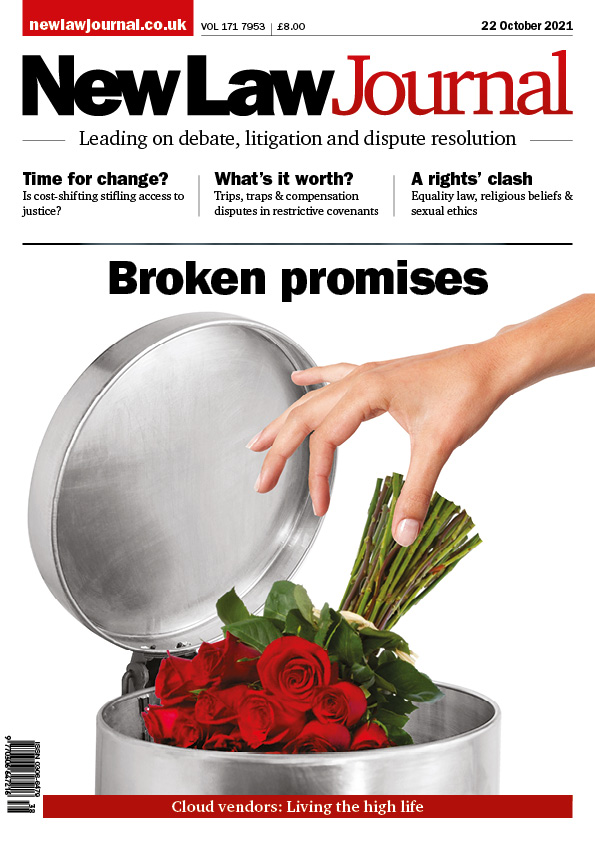THIS ISSUE

In the first of a new series of updates written by members of the Commercial Litigators’ Forum, chair Hilton Mervis puts the case for adopting a different approach to costs
What does a modern cloud look like & can your vendor deliver it? Mark Richman shares some steps to success
John Cooper QC casts a legal eye over this year’s BFI London Film Festival
Nazia Rashid considers whether reinstating breach of promise to marry could fill a gap in the law
John O’Hare explores the options available to help people with financial troubles
Consultant law firms are growing in popularity but may want to retain some of the advantages of the partnership model, says Oliver Brice
Nicholas Dobson considers whether equality law permits religious organisations to uphold their views on sexual ethics in the way they work
How speech technology is transforming policing, courts and prisons
Andrew Francis looks at trips, traps & compensation disputes in restrictive covenant matters
MOVERS & SHAKERS

Jurit LLP—Caroline Williams
Private wealth and tax team welcomes cross-border specialist as consultant
.tmb-mov69x69.jpg?sfvrsn=961ae4db_1)
HFW—Simon Petch
Global shipping practice expands with experienced ship finance partner hire
95ca96e3d47f4eff8d147c4f0df17c77.tmb-mov69x69.png?sfvrsn=3db5d86b_1)
Freeths—Richard Lockhart
Infrastructure specialist joins as partner in Glasgow office
NEWS
Talk of a reserved ‘Welsh seat’ on the Supreme Court is misplaced. In NLJ this week, Professor Graham Zellick KC explains that the Constitutional Reform Act treats ‘England and Wales’ as one jurisdiction, with no statutory Welsh slot
The government’s plan to curb jury trials has sparked ‘jury furore’. Writing in NLJ this week, David Locke, partner at Hill Dickinson, says the rationale is ‘grossly inadequate’
A year after the $1.5bn Bybit heist, crypto fraud is booming—but so is recovery. Writing in NLJ this week, Neil Holloway, founder and CEO of M2 Recovery, warns that scams hit at least $14bn in 2025, fuelled by ‘pig butchering’ cons and AI deepfakes
After Woodcock confirmed no general duty to warn, debate turns to the criminal law. Writing in NLJ this week, Charles Davey of The Barrister Group urges revival of misprision or a modern equivalent
Family courts are tightening control of expert evidence. Writing in NLJ this week, Dr Chris Pamplin says there is ‘no automatic right’ to call experts; attendance must be ‘necessary in the interests of justice’ under FPR Pt 25






